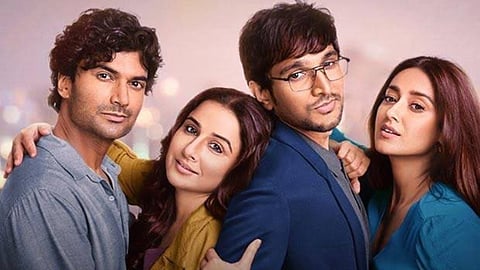Do Aur Do Pyaar Movie Review: A poignant meditation on love and marriage
Do Aur Do Pyaar Movie Review(3.5 / 5)
Love is usually explored in popular culture with whatever happened leading up to it. It is seen as a trophy, as the means to cleanse you of suffering. That way, there is a burden of fantasy attached to it; love seems to offer a resolution. However, through all of this, it is not given any expiry date. If there is a tangible moment in time when two people define their feelings for each other as extraordinary, then when does it cease to be that way? Who breaks the bubble of the ‘happily ever after'? Do Aur Do Pyaar lingers on such questions, and delves deeper into flawed individuals, beyond the often-projected perfect exteriors. The film is not interested in looking at smiling family portraits but the marks that they leave behind on empty walls.
Director: Shirsha Guha Thakurta
Cast: Vidya Balan, Pratik Gandhi, Ileana D’Cruz, Sendhil Ramamurthy
It features Anirudh (Pratik Gandhi) and Kavya (Vidya Balan) as a couple who have been married for 12 years. Coming from different parts of the country, they had to elope in order to get married. Now, after all those years, the dreams woven together by young hearts have begun to fizzle. Love is ultimately not enough, it seems. For them it stays hidden, often crawling up on the bed in the space between the two or making its absence known through eyes that lack any spark when they meet. Hence, both of them seek companions outside their marriage in order to fill the emptiness in their hearts. Anirudh has been seeing Nora (Ileana D’Cruz) for two years and finds comfort in her presence. Similarly, Kavya latches on to photographer Vikram (Sendhil Ramamurthy) as they make plans to live together at a sea facing flat in Mumbai. The exciting rhythm of these new-found romances is broken when Kavya’s grandfather dies and she has to visit her native place, Ooty. To her surprise, Anirudh decides to tag along.
The film takes its sweet time in establishing the nature of their relationship and how it used to be before it slipped into the mundane. Debutant director Shirsha Guha Thakurta creates visuals that speak for themselves in establishing the signs of eroding love where silences carry the burden of a scarred bond. There is always a sense of awkwardness in the air, as if the two are strangers living with each other. The space between them remains wilfully empty, be it in the taxi ride to the airport or on the flight where they are shown to be seated in different rows. Later, in Ooty, the two decide to head to the hotel which had played a central role in their elopement all those years ago. As their minds are drenched in nostalgia, Kavya wonders what has become of their life. She points to the half-moon in the sky and remarks how in films it is always so beautiful and complete. There is a certain yearning in her eyes for the ever-beautiful romance in cinema where it has longevity. In a moment of meta-awareness, her untoward desires reflect the glory of their past life, which is almost like a legend, in contrast to the stark reality of their present.
The tone of the film hits several notes along with that. There are unlikely instances of humour splattered along with some serious scenes that only further the frustration felt by the characters. Kavya starts an argument with her rude father as he is narrating the obituary of her dead grandfather to a typist. It reminded me of the hilarious plumber scene in Kapoor and Sons (2016), although not fully realized in its outcome. Vidya Balan exhibits a strange mix of anxiety and subdued charm in the scene as she confronts her father. At other times, she brings up vulnerability that is matured and laced with a confused outlook of a teenager. Her scenes with Pratik make the film livelier where he is soft and merry to her pent-up roughness. Their performances beautifully complement each other in bringing out more about the characters than what meets the eye. For the major part, it is in their undoing, that the film reveals its innermost layers.
Watching Do Aur Do Pyaar is like listening to a melody that feels familiar yet affects you in myriad ways. It is at once a meditation on the long-lasting epilogue of love; of marriage which is more than just an act of showing up each day and of heartwarming connections that can be made more than once. Its triumph lies in not falling into the repetitive tracks of ‘finding each other’ or ‘rekindling of love’, thereby saving itself from being reductive. What it chooses to leave behind is the feeling of solace in incompletion. It reiterates that marriage is not a one-day job, and that love is not a noun, but a verb.

